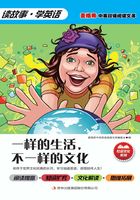
13 Gestures

My name is Nic k. I'm f ro m Canada. In 1998, I was on the island of Pohnpei in the Pacific Ocean . I went to teach at a school there. On my first day on the island, something unusual
. I went to teach at a school there. On my first day on the island, something unusual happened.
happened.
It was very hot, and I was thirsty. I went into a small store. I spoke to the woman behind the counter.“Do you have any cold drinks? ” I asked.
The woman looked at me, but she didn't say anything. I thought she didn't understand me, so I tried easier words, “Do you have Coke? ”
Again, the woman was silent. She didn't answer, so I thought that she didn't have any Coke. I spoke louder and more slowly. “Do you have anything else? ”
The woman walked over to a refrigerator . She opened the door and pointed to many different kinds of soda
. She opened the door and pointed to many different kinds of soda .She didn't say anything, but she removed a Coke and put it on the counter. Speaking slowly and clearly, I asked, “How much does it cost? ”
.She didn't say anything, but she removed a Coke and put it on the counter. Speaking slowly and clearly, I asked, “How much does it cost? ”
In perfect English, she answered, “Fifty cents.”
On Pohnpei,people say yes by raising their eyebrows a little.The woman raised her eyebrows when Nick asked questions. Nick did not see her gesture
a little.The woman raised her eyebrows when Nick asked questions. Nick did not see her gesture because it had no meaning for him. In Canada, raised eyebrows do not answer questions. Canadian people speak or move their heads up and down to say yes.
because it had no meaning for him. In Canada, raised eyebrows do not answer questions. Canadian people speak or move their heads up and down to say yes.
Later, Nick found out that all of the people on Pohnpei raise their eyebrows to say yes.